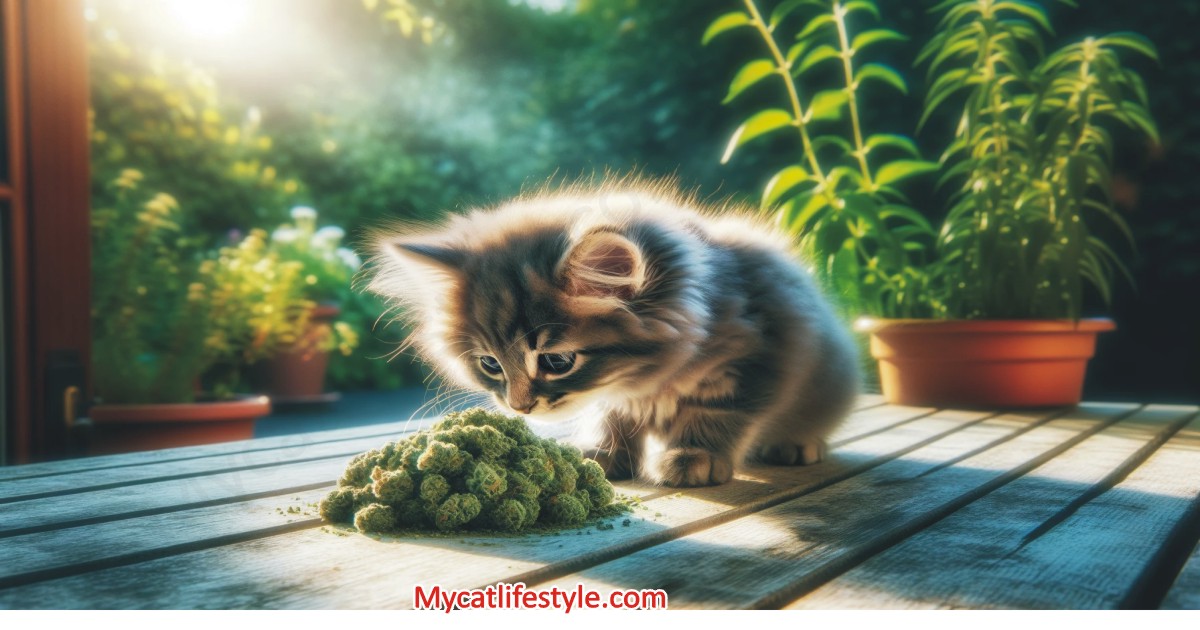At What Age Can a Cat Have Catnip Without Risks? Expert Tips

Catnip is well-known for its intoxicating effects on cats, and its reputation is widespread. It has even become a significant part of popular culture; for instance, Ray Bradbury famously compared libraries to catnip.
With its notable reputation, you might question whether catnip truly has such a strong impact. Can it really intoxicate your cat, or perhaps make them addicted?
Additionally, you might be curious about whether it’s safe for younger cats, like kittens.At What Age Can a Cat Have Catnip Without Risks?

At what age can a cat have catnip?
Pet owners often find joy in the happiness of their furry companions. Seeing our cats happy brings us joy as well. Catnip is famously effective in delighting cats, but is it suitable for kittens?
While catnip can be given to cats of all ages, it may not always affect very young kittens. Fortunately, even if it doesn’t elicit a response, it’s harmless to them.
What Age Will Catnip Affect Cats?
Catnip usually starts to affect cats when they are between 3 to 6 months old. If you offer catnip to a kitten younger than this, they might just ignore it. However, every cat is unique. Some cats might not respond to catnip at 6 months old but may develop a liking for it as they mature. Others might never be affected by catnip at all.
Similarly, older cats may also show less interest in catnip. As cats grow older, they can lose their sensitivity to its effects.

Why Does Age Matter?
The key component in catnip is nepetalactone, which closely resembles a natural pheromone in cats, explaining their sensitivity to it. Cats possess a specific brain receptor that reacts to catnip due to this pheromone similarity.
This connection is also believed to be why the response to catnip is age-dependent. Cats that haven’t reached sexual maturity may not react to cat pheromones in the same way adult cats do.
Furthermore, this might explain why catnip doesn’t always affect older cats. As they age, it’s possible they lose their sensitivity to this pheromone, diminishing their reaction to catnip.

What is Catnip?
Catnip, scientifically known as Nepeta cataria, belongs to the mint family, making it a relative of peppermint. Originally native to Europe and Asia, it has since spread and now thrives in many parts of the world.
Types of Catnip
Catnip is available in various forms, all derived from the catnip plant. Dried catnip is particularly popular among cat owners and can also be used to brew tea for human consumption—just ensure it’s human-grade if you plan to try it yourself.
For those preferring a more potent option, fresh catnip is an excellent choice. You might need to source it locally or consider growing your own. By purchasing a catnip plant or seeds, you’ll have a continual supply. Fresh catnip can be used just like its dried counterpart.
Another option is catnip sprays or oils, which can be applied to cat toys, beds, or scratching posts to attract cats to these items. The hope is that cats will continue to enjoy these items even after the effects of the catnip have worn off.
Lastly, there are catnip-infused toys, which may contain dried catnip or catnip oil. These toys are effective for encouraging play, but it’s wise not to leave them out all the time to prevent excessive exposure.

What Happens When My Cat Has Catnip?
Catnip has some fascinating effects on the feline brain, essentially causing a state similar to being “high.” Fortunately, it’s completely safe and enjoyable for cats.
When a cat smells catnip, it activates two specific brain regions: the amygdala and the hypothalamus. The process starts in the amygdala, which receives signals from the olfactory bulb, responsible for the cat’s sense of smell.
These signals are then relayed to the hypothalamus, which is involved in regulating emotions, sexual responses, and the pituitary gland. This chain reaction contributes to the strong behavioral responses observed in cats exposed to catnip.
The reactions to catnip can vary significantly among cats. Some may become highly energetic and playful, reminiscent of their kitten days. Others might become exceedingly affectionate, while some may relax profoundly, appearing to zone out or even experience hallucinations.

Does Canip Affect All Cats?
I find catnip tea quite soothing. While it doesn’t produce a high in humans, it does have a calming effect. When I acquired a new cat, I thought sharing catnip would be a perfect bonding activity for us.
However, to my surprise, my cat showed no interest in catnip. I wondered what I was doing wrong, only to discover that some cats are just not responsive to catnip’s effects.
Indeed, 20-30% of cats are unaffected by catnip, regardless of their age. This lack of response is due to genetics; there’s a specific gene responsible for sensitivity to catnip, and some cats simply don’t have it. So, if your cat doesn’t take to catnip, it’s simply a part of their genetic code.

What if My Cat Doesn’t Like Catnip?
Not every cat or kitten reacts to catnip, and if yours doesn’t, you might wonder what alternatives exist. Silver vine can be an excellent substitute to provide the same type of enjoyment for your cat, though it’s important to note that kittens under 8 months old typically do not respond to silver vine either.
For older cats, however, silver vine often proves irresistible and its effects can be similar to those of catnip, including sedation, hyperactivity, rolling around, and licking. The effects of silver vine also tend to last longer than those of catnip, with a “buzz” that can continue for about 30 minutes, compared to about 10 minutes with catnip.
Additionally, silver vine has a broader appeal, affecting about 80% of cats. Remarkably, 75% of cats that are unresponsive to catnip do react to silver vine, making it a valuable alternative for cat owners looking to engage their pets.

Is catnip okay for kittens?
Yes, catnip is safe for kittens, but very young ones often don’t respond to it. Specifically, kittens under 3 months old typically show no reaction to catnip.
However, as they grow and reach the age range of 6-9 months, you might start to see some effects. At this stage, it’s worth introducing catnip to see if your kitten responds to it.

Catnip Alternatives
If younger kittens don’t respond to catnip or silver vine, there are still several safe and effective alternatives for cats of all ages.
Valerian, widely recognized as a sedative and sleep aid for humans, can have a surprisingly different effect on cats. It tends to make them more energetic and playful. However, like with other stimulants, not all cats will respond to valerian; about 50% of cats are found to enjoy its effects.
Tatarian Honeysuckle is another alternative that can mimic the effects of catnip, with about half of the cat population responding to it. It can stimulate cats and make them more sociable.
For calming your kitten, lavender or chamomile are excellent choices. The scent from these plants has been shown to have a soothing effect on anxious cats, making them useful for helping your kitten relax and feel more comfortable.

Catnip Aggression
Some cats, particularly sexually mature males, may exhibit aggression when exposed to catnip. This behavior is thought to occur because catnip mimics certain pheromones, which can trigger aggressive responses.
While most cats tolerate catnip well if they react to it at all, if your cat or kitten shows aggression when using catnip, it might be wise to try an alternative. Offering different options like silver vine, valerian, or Tatarian honeysuckle could provide similar enjoyment without the aggressive side effects.
How much catnip can kittens have?
If you’re considering introducing catnip to your kitty, it’s crucial to understand the appropriate amount to offer.
Catnip Dosage
While there’s no strict limit to how much catnip you can give your kitten at one time, it’s wise to start with a small amount, such as a teaspoon to a tablespoon. Cats cannot overdose on catnip, but moderation is key, especially at the beginning.
It’s advisable not to give catnip to kittens under 3 months old, as they are unlikely to respond to it. For kittens that are of an appropriate age, begin with a small dose and observe their reaction. You can gradually increase the amount if they enjoy it and show no adverse effects.
Catnip Timing
The timing of when you give catnip is more crucial than the quantity. After a catnip session, your kitten will typically need a break of about 30 minutes to an hour before they can respond to catnip again. The effects of catnip last approximately 10 minutes, so resist the urge to give more immediately after the initial exposure.

How Often Can You Give Catnip?
Opinions vary on how frequently catnip should be given. Some experts believe it’s safe to offer catnip daily, while others recommend limiting it to once or twice a week. The potential for cats to lose sensitivity to catnip with frequent use has been suggested, but there is no definitive research confirming this. Moderation can help maintain its effectiveness and novelty for your cat.
What Kind of Catnip Should I Use?
Catnip is available in various forms and can be found almost everywhere. It is commonly incorporated into toys, and also available as sprays and powders. You can purchase catnip in small bags where it resembles finely chopped grass or herbs. Another option is to grow catnip in your garden; it’s a hardy plant that adapts to various environments. However, a potential downside of growing catnip is that it might attract stray cats to your yard. For a more controlled and potent option, consider buying high-quality organic catnip from your preferred pet supply store. Organic catnip is less likely to contain unwanted chemicals or fillers like hay, which can dilute its potency. Additionally, it often comes in a resealable bag to help keep it fresh.

FAQs About Catnip and Cats
Is catnip safe for kittens?
Yes, catnip is safe for kittens. However, very young kittens may not respond to it. It’s generally harmless, but they might not show any interest or reaction until they are a bit older.
At what age can you give a kitten catnip?
While catnip is safe and you can introduce it at any age, kittens typically start responding to it once they are around 3 to 6 months old. Before this age, they may not react to it at all.
At what age are cats affected by catnip?
Cats can be affected by catnip from as young as 3 months old, with more consistent reactions typically seen as they approach 6 months. The response to catnip tends to peak when cats are sexually mature, and may diminish in older cats.
Do cats eat catnip or just smell it?
Cats primarily react to the smell of catnip. They may roll in it, rub their faces on it, and sniff it intensely. Some cats may also chew or eat catnip, but it’s the scent that triggers the typical euphoric reaction. Eating too much can cause mild digestive upset, so it’s best if they mostly smell it.
Summary
Catnip can be a delightful treat for your cat, often providing as much entertainment for the owners as it does for the cats themselves. The response to catnip varies; while some cats may start running around, others might roll over it seeking attention. As noted by Thomas from IPet Guides, not all cats react to catnip, but this doesn’t mean they don’t enjoy different aspects of it. Experimenting with various forms of catnip can help determine what your cat prefers. It’s an excellent way to encourage activity and stave off boredom in your pet. Catnip is completely safe and typically produces no negative side effects, although it may not affect every cat. Keep in mind that kittens may need to reach about 6 months of age before they can fully respond to catnip, as their senses are still developing.





